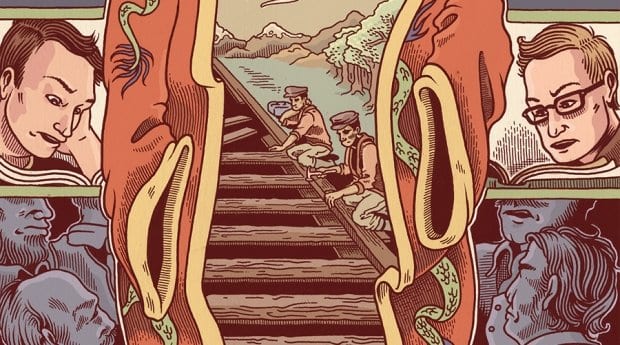Emperor Ai, the young Han Dynasty ruler who was emperor from 27 to 1 BCE, was besotted with Dong Xian. Ai doted on Dong, giving him riches, weapons and eventually making him supreme commander of the armed forces. The story goes that the two lovers were in bed one night and Dong fell asleep on the arm of Ai’s robe. In order to rise without waking Dong, the Emperor cut off his sleeve and slipped away, leaving his beloved to sleep undisturbed. This tale gave rise to the phrase “the passion of the cut sleeve,” a Chinese euphemism for same-sex love. It’s just one example of China’s rich tradition of queer relationships, a history rooted in Confucian doctrine that rarely addressed hetero, let alone homo, sexuality. While there was a duty to one’s ancestors to produce children and encouragement to follow certain gender roles, there were no gods in Chinese history that called down death and destruction on gays. At worst, homosexuality was seen as something funny, and it was often romanticized.
This sets the scene for mid-19th-century Canada, which saw groups of Chinese migrants flocking north from California to British Columbia following the Fraser Valley gold rush. Later, Chinese men were imported in large numbers to make up for labour shortages on railroad construction projects. Work was easier to come by in North America than in impoverished China, and communities would often raise money to send their men overseas. Many left behind wives and children and saw their relocation as temporary; making little attempt to assimilate, they brought the traditions and social practices of their homeland to the United States and Canada.
Centuries of Western travel narratives had already pinned China as a New Sodom. “An Account of the Empire of China,” a 1665 essay by Dominic Fernandez Navarette, explains that “sodomy is frequent in China” and that “in the time of the Chinese [Han] emperors, there were public stews [brothels] of boys in the imperial city Pequin [Beijing].” As the 19th century drew to a close, the social purity movement reached hysterical heights, and this perception of the Chinese homosexual fed vehement racism and homophobia. Social theorist Max Nordau claimed “degeneration” was a kind of physiological decay caused by urbanization, art and effeminacy and was spread by non-European immigrants, non-Christians, prostitutes, gamblers, homosexuals and the poor. Of course, this degeneration could be overlooked when Canada needed work done. As the first prime minister, Sir John A Macdonald, stated, “It is simply a question of alternatives: either you must have this [Chinese] labour or you can’t have the railway.”
After the railway was completed, political sentiment turned against these migrant workers, and a royal commission was created to scrutinize Chinese immigration. Homosexuality was seen as something that came from other places (China, India, First Nations communities), so it became a hot topic. Thomas King, an American merchant, told the commission that “thirty or forty boys, leaving Hong Kong apparently in good health, before arriving here would be found to be afflicted about the anus with venereal diseases, and on questioning the Chinese doctors to disclose what it was, they admitted [sodomy] was a common practice among them.” Cornelius Mahony, an Irish businessman, attributed this to the lack of women brought into new countries.
The perception of “degeneracy” meant that at the conclusion of the royal commission the Canadian government began to legislate acts that made fees for immigration astronomical for Chinese people. These fees grew drastically until there was a ban on Chinese immigration in 1923, enforced until the end of the Second World War. Throughout all these decades, even as Chinese immigrants in Canada were charged disproportionately with almost every other crime, charges of “sodomy” and “gross indecency” are almost completely absent in Canadian court documents. A single exception is an 1887 case where a man named Ah Hoy was sent to a BC penitentiary for “Assault with the intent to be carnally known.” In Victorian legal jargon, “to be carnally known” meant Hoy was seeking an active, consensual male partner — another who shared the passion of the cut sleeve.
History Boys appears twice a month on dailyxtra.com.


 Why you can trust Xtra
Why you can trust Xtra


